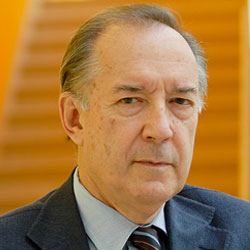
About
Professor Bizzi's lab is no longer active and he is not accepting students.
Emilio Bizzi is an MIT Institute Professor Emeritus and an Emeritus Investigator in the McGovern Institute for Brain Research. He retired from active research in 2017 and is no longer accepting students or research staff. He earned an M.D. from the University of Rome in 1958 and a Ph.D. from the University of Pisa in 1968. Dr. Bizzi joined the MIT faculty in 1968 and served as director of the Whitaker College of Health Sciences and Technology from 1983 to 1989. Dr. Bizzi chaired the MIT Department of Brain and Cognitive Sciences from 1986 to 1997. He was appointed Investigator at the McGovern Institute in 2001. Among many other honors, Dr. Bizzi became a member of the National Academy of Sciences in 1968 and the Institute of Medicine in 2005. He received the President of Italy's Gold Medal for Scientific Contributions in 2005 and in 2006 was elected as President of the American Academy of Arts and Sciences.
Research
Motor Control and Motor Learning
One of the central questions in the field of motor control is to understand how our motor goals are translated into actions. The Bizzi laboratory has elaborated a theoretical and experimental framework that describes the way in which the central nervous system transforms planned movements into muscle activations. Among the techniques used by the lab are behavioral training, cortical recording from single neurons, electromyographic (EMG) recording of muscle activity, microstimulation, cellular inactivation, kinematic measurement of movements in three dimensions, functional imaging, and computational modeling. Experimental models currently include frogs (including spinalized and spinal cord-isolated preparations), rats, cats, rhesus monkeys, and humans (both patients and normal subjects). The Bizzi lab is affiliated with the McGovern Institute for Brain Research.
Combination of Motor Primitives
In the natural world some complex systems are discrete combinatorial systems - they utilize a finite number of discrete elements to create larger structures. The genetic code, language and perceptual phenomena are examples of systems in which discrete elements and a set of rules can generate a large number of meaningful entities that are quite distinct from those of their elements. A question of considerable importance is whether this fundamental characteristic of language and genetics is also a feature of the vertebrate motor system. In the last few years, my colleagues and I have asked this question: are there simple units (motor primitives) that can be flexibly combined to accomplish a variety of motor tasks? We have addressed this fundamental and long-standing question in experiments that utilize spinalized frogs, rats, and currently monkeys. With an array of approaches, such as microstimulation of the spinal cord, NMDA iontophoresis, cutaneous stimulation of the hindlimb, and vestibular activation, we have provided evidence for a modular organization of the frog's and rat's spinal cord. A "module" is a functional unit in the spinal cord that generates a specific motor output by selecting a specific pattern of muscle activation (a synergy).
Recently, we have tested the hypothesis that linear combinations of muscle synergies represent a general mechanism for the construction of motor behavior. To this end, we have examined several motor behaviors in intact, freely moving frogs. We recorded simultaneously from a large number of hindlimb muscles during locomotion, swimming, jumping, and defense reflexes, like wiping and kicking. We found that muscle activity patterns in each behavior could be reconstructed as linear combinations of a small number of muscle synergies. Moreover, some of the synergies were similar across different behaviors. Currently, we are investigating the way in which the CNS controls the hand movements of the monkey. The large number of muscles involved in the control of hand and finger movements and the variety of complex motor behavior of the hand make the hand an ideal model system for testing the validity of the modularity hypothesis.
Publications
Overduin SA, Zaheer F, Bizzi E, d'Avella A. An instrumented glove for small primates. J Neurosci Methods. 2010 Mar 15;187(1):100-4. Epub 2009 Dec 23.
Cheung VC, Piron L, Agostini M, Silvoni S, Turolla A, Bizzi E. Stability of muscle synergies for voluntary actions after cortical stroke in humans. Proc Natl Acad Sci U S A. 2009 Nov 17;106(46):19563-8. Epub 2009 Oct 30.
Berniker M, Jarc A, Bizzi E, Tresch MC. Simplified and effective motor control based on muscle synergies to exploit musculoskeletal dynamics. Proc Natl Acad Sci U S A. 2009 May 5;106(18):7601-6. Epub 2009 Apr 20.
Overduin SA, Richardson AG, Bizzi E. Cortical processing during dynamic motor adaptation. Adv Exp Med Biol. 2009;629:423-38.

